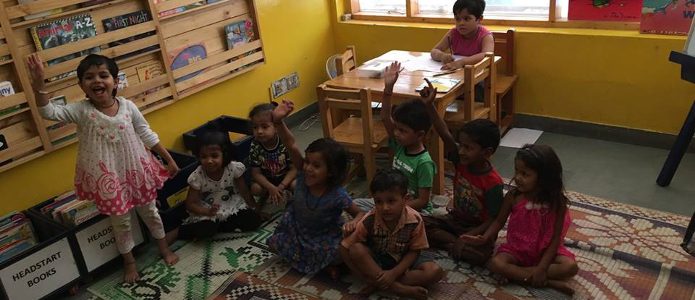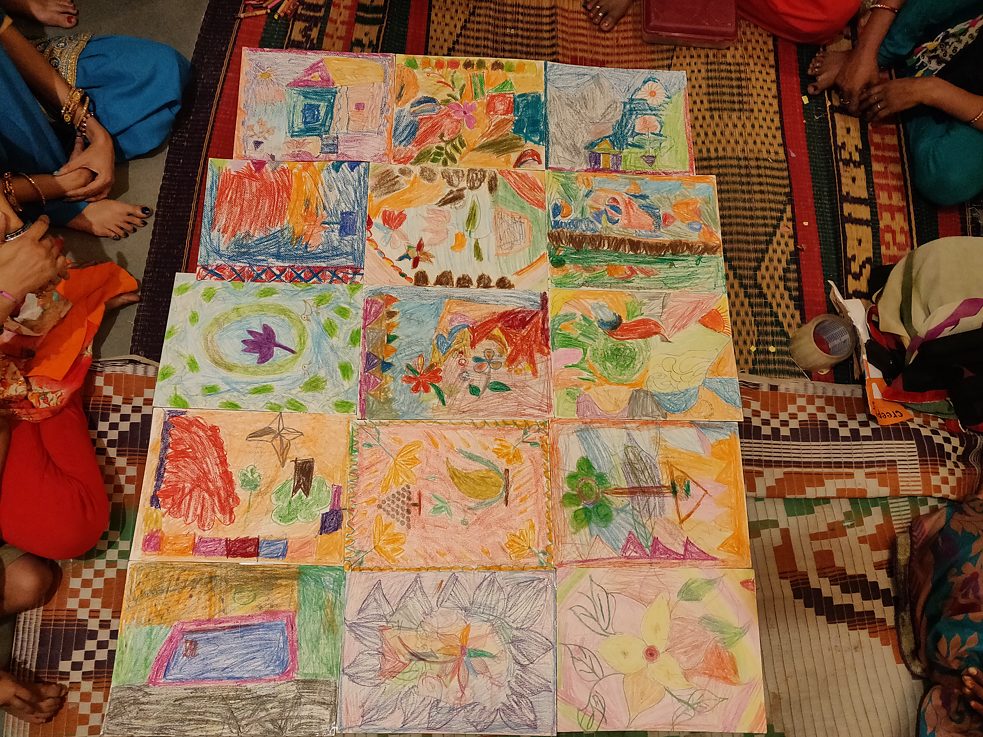Community library
A New Kind of Love

Delhi-based author Mridula Koshy and her partner Michael Creighton started the Community Library Project, that is helping hundreds of children become readers and, more importantly, thinkers. Read more about this library along with a very personal story of the founder.
By Mridula Koshy
It was afternoon, the sun was pouring in, and my then three year old was resisting his nap. I was next to him, nearly asleep. ‘It’s called pat pat love,’ he said as he patted me. He sounded a little bit surprised and a little bit proud: ‘Amma, I have invented a new kind of love.’
It is another afternoon. A group of women and one man gather in a circle on the floor of the library. They are there because the librarian has invited them to experience the library as their children and grandchildren experience it. First she reads them a story. She reads the picture book, Ladka Jisne Poocha Kyon. The English version is titled, The Boy Who Asked Why. It is the story of one of modern India’s founding leaders, Bhimrao Ambedkar. It is a story of caste atrocity visited on a child.
The grandfather speaks at length and says both that these terrible things no longer happen and that it is horrible how these things continue to happen. The librarian finally has to interrupt and she says gently, ‘We will now hear from the ladies.’ The women speak a few words between all of them, and they too say that it is terrible, and that it happens, sometimes.
The librarian hands out large sheets of paper, one to each of the participants in the circle. The paper is exceptionally thick. I know something about this paper but I ignore the knowing. There are small babies in the room. Women are giggling into their babies’ necks, into the pallu of their sarees. They protest that they do not know how to draw. But some are already drawing, vigorously. The babies are in the way. They are crawling over the drawings.
Quickly then, the babies are cajoled from their mothers or simply lifted and carried next door to the Reading Room. There, a library member helps the babies with their own sheets of papers and colours. Yet another library member joins him and then a third. And this is how fourteen little ones are kept content for the time being. The three helpers are very sober about discharging their responsibility for all that they are only between 11 and 12 years olds themselves. They are vying for future membership in the Student Council, the library’s forum for member leaders.
Back in the room with the circle of adults, a member of the Student Council repeatedly risks stumbling over crossed knees as he hands out paper cups of tea. Tinny music is heard coming from the librarian’s phone. Now it plays and now it switches off. When it switches off, there are soft exclamations of distress and hands that were busy with colour pencils come to a halt and the drawings pass from right to left, around the circle. The music starts again and now no one is protesting that they don’t know how to draw. And now while the music plays, and now while the Student Council member continues his gawky but earnest way around the circle, helping get a purple colour pencil from one side of the room to another, the librarian allows herself to look pleased.
It is a brief moment and already and again there are two new parents who have arrived, who want to join the circle. The room is small, It is here on Saturday mornings that a handful of 4 to 6 year olds meet for the Headstart to Reading program which introduces them to books and storytime alongside of play and pretend and song, colours and snacks. There isn’t space in this room meant for little ones to accommodate two more parents. But this is a trick the librarian knows how to do, and she does it with pursed lips and furrowed brow and a welcoming smile.
A few more times the pages change hands, heads are bent over them, colours are requested from across the room, and then it is time. The music stops. All of the pages are filled, edge to edge, with colour; all of the pages have felt all of the hands of the circle of parents. The Student Council member tapes the drawings together – three across and five down. It is a quilt of colour, it is the library quilted together. There is a feeling of surprise in the room, and there is pride on the faces of those around the circle. It is scary to ask out loud and no one does ask: have we invented a new kind of love?
 A New Kind of Love
| © Mridula Koshy
Later in the evening the cardboard back, brown and plain, and the maroon front with the cursive inscription ‘Drawing Pad’ will be placed in the return basket by the circulation desk. No sheets left between the two ends. I will feel forced to explain why I am hanging on to now empty pad of paper. I will say, ‘It is good cardboard. We can still use it for something.’
A New Kind of Love
| © Mridula Koshy
Later in the evening the cardboard back, brown and plain, and the maroon front with the cursive inscription ‘Drawing Pad’ will be placed in the return basket by the circulation desk. No sheets left between the two ends. I will feel forced to explain why I am hanging on to now empty pad of paper. I will say, ‘It is good cardboard. We can still use it for something.’
I will not say it was my mother’s. I will not say that nine months ago I cleaned her home, emptied it all save what I packed into a carry-on bag: her sweater, three of her sarees, her chapstick, a lock of her hair in the plastic envelop the funeral home handed me, her charcoal pencils, her drawing pad, a bit of exceptionally beautiful wrapping paper that I thought to myself the children at the library would appreciate. I still have the sharpener but I have lost the eraser I took from her desk. I have used up most of the bobby pins and the card on which they were packaged is nearly empty now. I chose it to take with me when I noticed her handwriting, my phone number written on a corner of the card, an old number from a lost phone, a number I have not answered in years, but one that she saved.
The library described in this story is a collaboration between TCLP and Deepalaya NGO and operates out of the Ramditti J R Narang Deepalaya Learning Centre. Two librarians, dozens of volunteers and young member leaders work together to keep the library a low cost citizen initiative.
The tiny 500 square foot space has over 2300 members and a collection of over 7000 books. Around 500 books are issued weekly and dozens of read alouds are offered throughout the week. The majority of members come from working class backgrounds and attend government schools. Members are often the first generation in their family to attend school.
To encourage reading, the library celebrates milestones achieved by young readers through its Honour Roll program which tracks every ten books read by members and rewards members with books of their own at key points on the reading journey. To date 1175 children have read at least ten books and 114 children have read more than hundred books.
The library does not levy fines for late or lost books. Instead, members who lose books can retain borrowing privileges by assisting in maintaining the library. Free access to the internet is available through the library's Cyber Project. Members attend workshops on a variety of topics like arts and crafts, theatre, creative writing, science and teen wellness. The library serves as a cultural hub through its invitation to writers and other artists to showcase their work in an inclusive setting to which all people are invited.
The library aims to serve its members, to develop best practices and programs that widen people's access to books and thinking, and to challenge others to create a vibrant public library system.
Comments
Comment